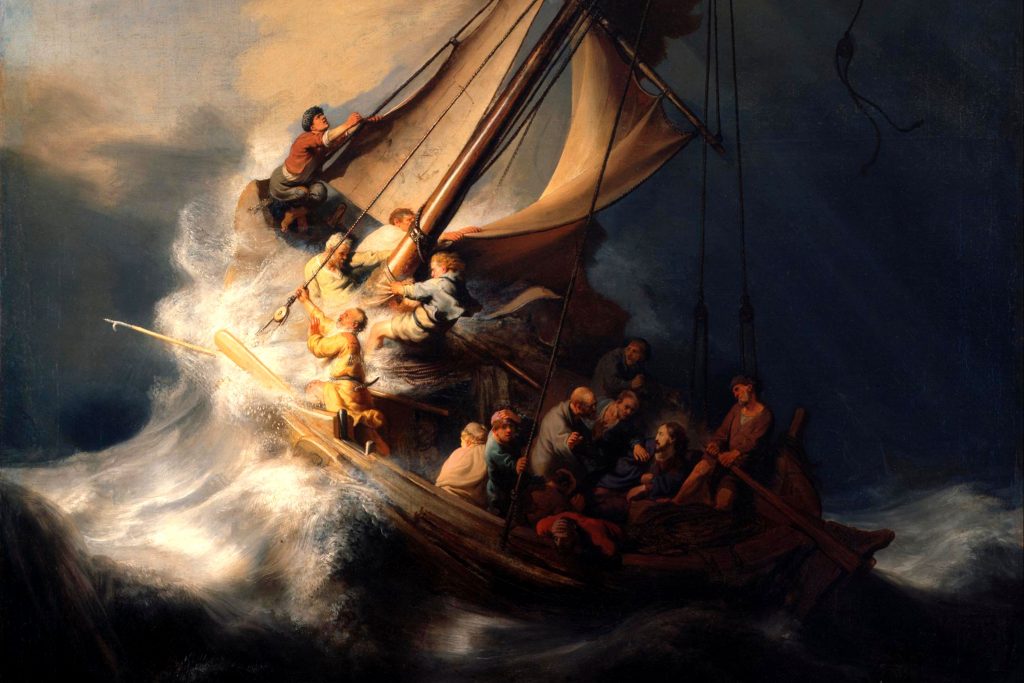
Reflection for the 12th Sunday of Ordinary Time (Cycle B)
Childhood memories of the awe-inspiring story of the Christ silencing the tempest have evoked our wonder at the God-man who can literally command earthly nature, and perhaps more amusingly, our unwavering confidence that “brother Jesus” can readily be called upon when a sudden squall threatens to postpone tomorrow’s outdoor family picnic.
In more perilous biblical times however, the reason for such a powerful image would have been less mundane. Mark is persuading his persecuted Christian community to see beyond the awe of an “amazing miracle” and to experience Christ’s divine love and compassionate action. According to the evangelist, the exalted Savior can also prevail upon the weaknesses of human nature, offering succor and protection from the confusion and anxiety of our daily drudgery.
So, not only can our Lord save us from the violent ambivalence of a dynamic creation; he can also save us from the violence of evil emanating from ourselves. It is a mesmerizing display of his ability to bring us out from destruction, an important portrait that must endure in the early days of Christian martyrdom, and which is of no less significance in our contemporary times of oppression, uncertainty, plague and alienation.
But in this episode, he makes a curious remark when he rebukes us for “not yet having faith.” Is he referring to a lack in the belief of what he can do for the love of us? Our traditional practices of piety seem to have been inculcated in us with the premise that our prayers must be appropriately loud, and that our minds and hearts must be appropriately strong to believe in his claim of being powerful enough to do whatever we want. Hence, unanswered prayers and unfulfilled private aspirations are the result of “not yet having faith.”
Though it is not incorrect to have a firm conviction in the belief of what our Lord is willing to do in his unconditional love for us, but we sensibly ought to have an equally firm conviction in the belief that we have an obligation to respond to that love. Shouldn’t privileges or rights come with commensurate responsibilities? He does seem to imply that “having faith” presupposes much more than a mere waiting for assured graces.
The Church has always been consistent in teaching the Christian’s role of “having faith” and “doing good works”, stressing James’ maxim that “just as the body is dead without its spirit, so faith without deeds is also dead.” (James 2: 26) However, our devotions to Jesus Christ have throughout Christian history tended to focus more on a passive or reactive morality dependent upon the outcomes of an active spirituality. Critical social action or our decisions to “do good and avoid evil” are conditioned upon “favorable responses of his divine love” to the advancement of our own agendas. We “do good works” only after seeing the “signs and wonders caused by having faith.”
Do we not tend to obey and follow him only “after our wishes are granted?” Is my sense of charity or justice “turned on” only when the Christ has been “proven to help?” This is not holy obedience, for such obedience is founded on a passivity humbled before the mysterious designs of God, whether his designs are likeable or not. This conditional – somewhat transactional – obedience implies the opposite: a proud subjugation of the will of the Spirit to one’s own.
We must not demean modern forms of popular piety from which so many of the marginalized draw their daily strength and inspirations, but we need to rethink its true meaning and purpose. Novenas, processions and weekly pilgrimages to the shrines of Baclaran and Quiapo are admirably fervent expressions of our trust in the God who cares about personal needs, but are they equally fervent expressions of our surrender to his calling to duty?
Our devotions to our Lord’s saving actions must focus more on an unconditioned morality coupled with a robust penitential spirituality. “Doing good and avoiding evil” are our contrite responses to the divine love that gave us mercy and compassion in spite of our unworthiness. Charitable service in the name of justice and peace, forms the basis of our Christian commitment as the apostle Paul writes, to “no longer live for ourselves, but for him who for our sake died and was raised.” We have become a “new creation in Christ.”
To have faith then, is to trust in this commitment to leave our former lives searching for a fleeting happiness, and to willingly offer it to his eternal goodness. To lack faith, is to refuse to believe in the Lord’s calling to temper the tempest in the human condition with him. We believe we can overcome the crises in our own lives through his help, precisely because we have already chosen to join him in his mission to achieve the kingdom of God, and to encounter his joys and sorrows as together we pacify the storms of hatred and greed.
Brother Jess Matias is a professed brother of the Secular Franciscan Order. He serves as minister of the St. Pio of Pietrelcina Fraternity at St. Francis of Assisi Parish in Mandaluyong City, coordinator of the Padre Pio Prayer Groups of the Capuchins in the Philippines and prison counselor and catechist for the Bureau of Jail Management and Penology.
The views expressed in this article are the opinions of the author and do not necessarily reflect the editorial stance of LiCAS.news.
Source: Licas Philippines
0 Comments